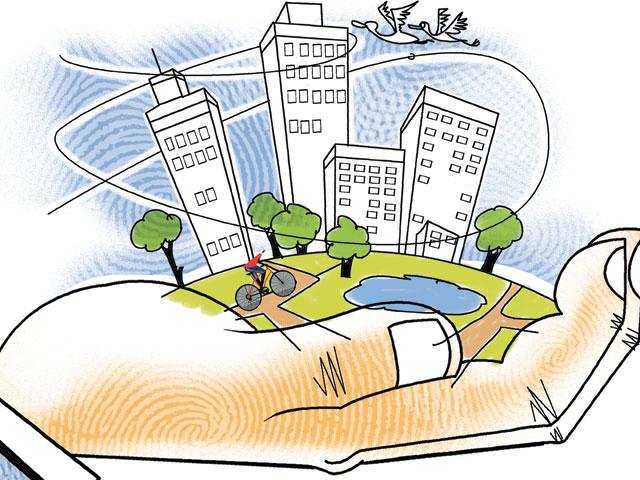Why urban Indians are heading to buy weekend homes
Urban India's increasing quest for solitude is turning places like the Himalayas & the countryside around Mumbai into vacation-home hotspots

Elegant farmhouses, koi ponds, equestrian facilities, themed event venues, beachfront gardens, and private golf courses – India's uber-rich have always splurged on their lavish vacation homes. Now, people of more modest means are getting on to the leisure-property ladder, buying weekend retreats to escape the madding city crowds.
Urban India's increasing quest for solitude is turning the foothills of the Himalayas or the Aravalli, and the verdant countryside around Mumbai or Bangalore into vacation-home hotspots, building in the process an ecosystem that appears to follow conventional market economics – of balanced supply and demand.
Take, for instance, Diana Gonsalves, a 34-year-old software executive from Mumbai. For the Holi weekend, she chose to give the tropical paradise of Goa a miss, choosing instead a villa in hill station Lonavala for Rs 7,000 per day. "I wanted to get away from the hustle and bustle of the city life," she said. "And it didn't charge me a bomb."
While Gonsalves sought a weekend getaway, Tanni Mandal wanted to rent out her villa at Lonavala, which is barely 82 kilometers from Mumbai. Mandal bought the vacation home last year, and it has been lying idle for most of the time since then. "I bought it for personal use, but who minds the additional income," says Mandal, who put her property on TripVillas, Asia's largest holiday-home rental company.
Consumers such as Gonsalves, who are not affluent enough yet to buy weekend homes, and buyers such as Mandal, who can afford to go for an additional property miles away from city, have driven expansion in the weekend-home market over the past year that wasn't rewarding for the urban property industry. With projects coming up near cities and providing modern conveniences, several affluent consumers are now buying vacation homes.
"While it would be an investment, it also doubles up as a getaway for short breaks," says AS Sivaramakrishnan, Head, India
Residential Services at CBRE South Asia.
Tata Housing would attest to the trend. The Tata Group's
real estate arm, which has second-home projects at Lonavala, Kasauli, Talegaon and Goa, has seen increasing investor interest. There is demand, says Tata Housing's corporate marketing head Rajeeb Dash, for second homes in locations that are well connected to bustling metros, yet serve as a convenient retreat from the cities. The properties, he points out, range from Rs 40 lakh to Rs 14 crore.
India's holiday-home industry, says Roshan D'Silva, founder of TripVillas, is a good investment and is expanding. For an astute real estate investor, the outgo is below Rs 40 lakh, and the buyer may make more than 10% on the investment, while reducing hotel expenses on annual vacation trips. In 2011, TripVillas started with just 200 weekend homes. The number has increased to more than 8,000 homes now, and another 3,000 are in the pipeline. "More and more customers see the value both in the space they get and the money they save by booking a holiday home," says D'Silva.
This segment of the property market has remained largely immune to the November 8 currency demonetisation. Tata Housing's Dash says demand continues to expand, underpinned by larger disposable incomes, constant innovation, and the need for periodic retreats. The first project, Prive, was a sellout in 2010, and the second project in Goa in 2016 was also oversubscribed. More than half of the second-home inventory at Myst, India's first project using biophilic architecture, were sold last year, claims Dash. With innovation and greater exposure, second homes have assumed a more evolved definition, including theme-based villa townships, he adds.
Nirvana Realty, a Mumbai-based builder, is focusing on theme-based villa townships. It has built a music-themed township on the Mumbai-Pune Expressway, a Bollywood-inspired township at Wada, and an outdoor-sports themed project at Murbad in the Western Ghats.
From music and Bollywood to community farming and adventure, theme-based weekend homes offer a unique
lifestyle experience that goes beyond plain-vanilla homes, says Punit Agarwal, CEO of Nirvana Realty. More disposable incomes, nuclear families, DINK (double income no kids) consumers have combined to drive this industry. "On an average, 19 units are sold every month," says Agarwal, adding that weekend homes are no more a status symbol. It has become more of an investment option to yield future returns and maintain an ideal work-life balance. The real estate player recently tied up with TripVillas, allowing owners to enjoy their holiday homes and also get additional income throughout the year.
Mehak Chopra is one such discerning consumer who opted for a weekend home in Dehradun when she travelled with her family during the last weekend of February. A frequent traveller, Chopra never settles for any luxury exotic hotel at hill stations. "The idea is to have quality time at a place where you can be yourself without any disturbance," she says. "Weekend homes let you do that," she says. The Delhi-based marketing honcho, who stays on rent in the capital, is exploring the option of buying one such property this year and putting it on rent. "It's value for money."
Santosh Naik, Managing Director of Mumbai-based real estate company Disha Direct, is not surprised with the changing profile of weekend buyers. While 49% of weekend home buyers are salaried, about 32% come from business background.
Until only a few years ago, says Naik, owning a home was a lifetime financial commitment, involving major retirement savings. Today, however, many Indians buy their first home in their late 20s, as strong economic growth, rising income levels, easy and attractive
home loan options, and the wide range of lifestyle homes have altered the market dynamics.
"In fact, most of them are investing in residences on the outskirts," says Naik, who has sold more than 12,000 weekend homes in the past 13 years. There's another dimension to the weekend homes, and that is driven by Corporate India, says Agyendra Jha, founder of Wings Lifespaces, a real estate player in Mumbai. Companies, Jha says, have started providing weekend homes to their top executives as a perquisite. Also, many invest in real estate for the long term.
"Gone are the days when the weekend home was only within the reach of a select few business-class people," he says. Jha's properties range from Rs 8 lakh to Rs 2 crore, with a strong focus on customization, and are located within 100 km of Mumbai. He says one can earn easily up to Rs 40,000 per month by listing these properties for rent. The consumer should need no bigger incentive, therefore.
 MUMBAI: Real estate prices continued to grow steadily according to the latest installment of Reserve Bank of India's House Price Index (HPI).
MUMBAI: Real estate prices continued to grow steadily according to the latest installment of Reserve Bank of India's House Price Index (HPI).

 Elegant farmhouses, koi ponds, equestrian facilities, themed event venues, beachfront gardens, and private golf courses – India's uber-rich have always splurged on their lavish vacation homes. Now, people of more modest means are getting on to the leisure-property ladder, buying weekend retreats to escape the madding city crowds.
Elegant farmhouses, koi ponds, equestrian facilities, themed event venues, beachfront gardens, and private golf courses – India's uber-rich have always splurged on their lavish vacation homes. Now, people of more modest means are getting on to the leisure-property ladder, buying weekend retreats to escape the madding city crowds.